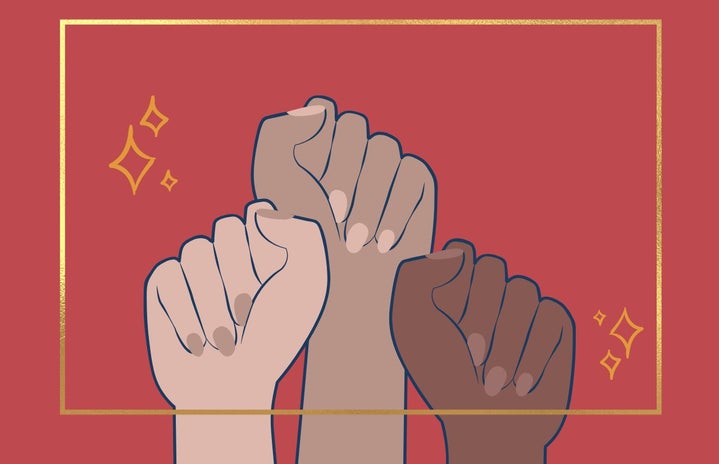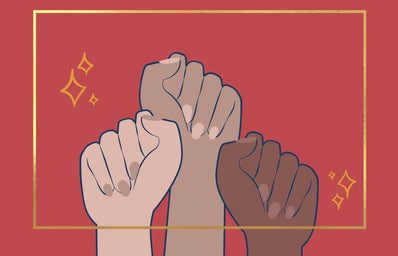As November, UK’s Islamophobia Awareness month, has ended recently, one could ask themselves why such a month is still needed. The evident response is that the proliferation of hate crimes towards Muslims communities remains a social pandemic poisoning Europe that cannot be ignored.
As part of our commitment to achieve active anti-racism, education and information are key, and here I’d like to explore the achievements of a gendered Muslim minority: Kurdish women and their combat.
The Kurdish people are the widest stateless ethnic minority. Occupying Kurdistan, a cultural region landlocked between Eastern Turkey, Iraq, Iran and Syria, the Kurds lack their own independent state. As such their identity is expressed through their own language and culture. A majority of them are Sunni Muslims.
As a rule, women, but especially Muslim women, involved in conflicts tend to be described by the Western media as oversimplified, character-lacking actors. Fed by influences of a post-colonialist discourse, Western countries continue to portray women as passive victims in dire need of saving, thus often justifying their interventionism. Besides dispossessing women from any kind of complexity or nuances as well as any sense of agency, this dichotomy of victim/saviour also ends up binding them to roles of submissiveness, in line with familiar socially constructed gender norms.
Notwithstanding, Kurdish women as a group have escaped this tale. But this is mainly because, as a branch of female combatants in the Kurdish army combating the troops of the Islamic State, they do not fit our Western vision of the subservient Muslim woman that we have previously maintained, thus making them ‘worthy’ of international attention.
On the battlefield, Kurdish women have played an essential role in pushing back the attacks of the Islamic State, as well as in defending their own Kurdish national identity against attacks from Turkey. However, general understanding of these combatants has been reduced to women undertaking the jobs of men, and, wrongfully, relatively little attention has been brought to their political ideology (even though it remains an essential element to the understanding of their roles in the Kurdish army).
With the Western media’s narratives framing Kurdish women as combating solely for reasons of resistance, the true motives lying behind their proactive struggle – to establish a better society have so far been completely omitted, and is what I’d like to bring attention to here.
Kurdish women combatants evolved in the YPJ; Yekîneyên Parastina Jin (or, Women’s protection Unit), which makes up for 35 % of all soldiers in the official Kurdish army. This army is affiliated with the Kurdish’s Worker party (or PKK), which was established in the 1980s in Turkey in order to push back against Turkey’s attempt to erase the Kurdish culture and to advocate for an independent Kurdistan.
The PKK bears a concrete ideology close to Western left-wing political parties, drawing on Marxist and Leninist ideas, which stands as an explanation as to why Kurdish women are so involved in the Kurdish Army. The PKK’s doctrine, also known as Jineology (literally translated to the ‘science of women’) puts women at the center of their philosophy. It sees the independence of the Kurds as intrinsically linked to the emancipation of women. In fact, in 2010, Abdullah Öcalan, founder of the PKK stated that “The freedom of the Kurdish people can be viewed as inseparably bound to women’s freedom.”
The Party, which believes in taking women’s experiences and voices into account when it comes to taking political decisions, possesses a separate unit for women (who represent 40% of the members), thus allowing them to grow independently from men. It defines itself as anti-colonial, anti-capitalist, and as an advocate for the end of ‘hegemonic masculinity’. The combat of women belonging to the YPJ is dual: against the extremely sexist Islamic State, and against the misogyny which reigns in their own Kurdish culture.
To Kurdish activist, Dirik, “The YPJ are not only fighting against ISIS, they are fighting for feminism and gender equality – and they’re doing it with ideas and bullets alike. They not only resist against feminicidal ISIS, but also the patriarchy and rape culture prevalent among their own community”; their struggle isn’t simply military, it is ideological and multifaceted.
Indeed; the PKK’s fight is de facto not limited to a military one, as it is also a combat encompassing a social dimension. It is thus reductive to imply Kurdish women are seeking only emancipation from their patriarchal societies (and contributes even more to the portrayal of women as victims), when they are predominantly and actively contributing to the establishment of an independent Kurdish society, which would revolve around principles of equality contained in the PKK’s ideology.
Kurdish women have disregarded the idea that their role should be dictated by their gender. As a consequence, they are no longer regarded as frail potential victims, but as equally strong soldiers by their male colleagues. The female battalion has not only played a pivotal role in countering the Islamic and Turkish threats in the region, but has also had an impact on the evolution of the Kurdish mentality regarding gender. Nowadays, all Kurdish institutions (whether they are religious, political, administrative or other) are bound to strictly egalitarian principles.
Interested in learning more about this topic? The wonderful female-directed documentary, Girls’ War, will further illustrate the subject of Kurdish female fighters and their accomplishments.

